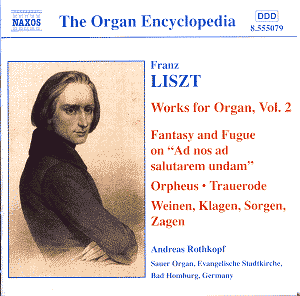Liszt, for long an international prodigy, has at least
two distinct styles of composition. In later life his piano pieces became
subtle and reflective, as well as distinctly ‘modern’ compared with
the showpieces of his earlier career as an international virtuoso. The
organ works are similarly revelatory and, though published mainly in
the composer’s mid-to-late career, contain passages that could easily
place them harmonically in the 20th century. None sounds
particularly ‘churchy’ in the conventional sense, and Naxos is to be
congratulated for devoting two discs to these highly-charged performances
on the magnificent Sauer organ.
The monumental Fantasy and Fugue on a Bach Chorale
plunges immediately into an exciting, chromatic style that reveals the
composer’s unconventional freedom. The opening pedal section leads to
brilliant passages on manuals and a wide choice of registration. To
some extent this is the Liszt of Les Preludes, though in a more
improvisatory and adventurous guise. After it the Trauerode, originally
an orchestral work, comes as a contrast – a quiet, impressionistic
reverie using the reed stops to magical effect against a sustained pedal.
This prevailingly placid mood is maintained almost
throughout the remaining pieces. Orpheus, transcribed for organ
from Liszt’s Symphonic Poem of the same name, is largely for
manuals, with a central episode of rising excitement and a quiet close
in which the Sauer organ shows one of its many fine qualities to perfection.
The Concert Piece will be familiar to pianists as one of Liszt’s Consolations
and works extremely well as a short voluntary.
Andreas Rothkopf has a deep and mature sympathy with
this music, and a musicianly approach to its elusive qualities: an altogether
delightful disc. The insert booklet is detailed and informative,
Roy Brewer
